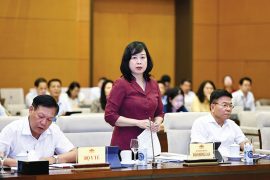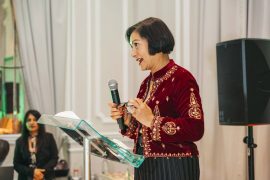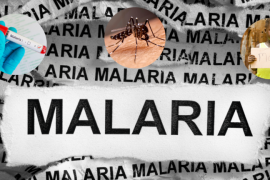The COVID‑19 pandemic is harming health, social and economic well-being worldwide, with women at the centre. From leading the health response to shouldering much of the burden at home caused by the pandemic, women have been at the forefront of fighting the virus. In a recent interview with the Amazons Watch magazine, the first lady of Paraguay, HE Silvano Abdo gave her thoughts on the role of women in the pandemic and many more issues. Excerpts.
In October 2019, the Coca-Cola Foundation Emprendemos Juntas program which supports female entrepreneurs and aspiring women signed an institutional agreement with the Office of the First Lady to increase the number of women reached by the initiative. Following the recent global economic disruptions by the COVID-19 pandemic, how would you say this agreement has fared, towards empowering women entrepreneurs in Paraguay?
The signing of the agreement between the Office of the First Lady, Coca Cola Paraguay, and the Paraguay Foundation, allowed joint efforts to promote programs that promote the economic development of women throughout the country. After the signing of the agreement, the program began to be implemented quickly when the arrival of COVID-19 occurred in March 2020, the program was already developed and allowed to provide care to the most vulnerable women, who, thanks to the tools and resources received, were able to develop their businesses and contribute to the family economy.
These actions were complemented by the AIKUAA program consisting of training, learning, motivation and formalization workshops for Paraguayan entrepreneurs who wish to start their own businesses, attending the time of the COVID-19 pandemic. The programs are broadcast through YouTube, social networks and Paraguay TV. These workshops are led by entrepreneurs who train on different topics, in particular related to the home, cooking and nutrition, orchard and gardening, education and crafts, thus encouraging those who have been affected at work in these difficult times that we have to live.
In your article titled “The pivotal role of rural women in the development of Paraguay” published by IICA4, you stated that in Paraguay, 1.3 million rural women maintain their households and their community through their work. However, despite their pivotal role and active contribution to the local and national economy, they continue to suffer discrimination, as reflected in their lower-income, scant resources, limited opportunities, and other forms of inequality. What measures is the Office of the First Lady taking, to bring these women out of the shadows? And to ensure that they are adequately compensated for their contributions, and included at all levels of society?
In the first place, it is important to make the reality of many women known, to raise awareness and seek solutions. From the OPD we are seeking to give a voice and put a face to all those women who are excluded or discriminated against within the productive sector. One way of doing this is through the campaign that as General Coordinator of ALMA, we are promoting, together with FAO #Rural Women, women with rights, where we are giving visibility to this situation and we seek to create awareness in society of the fundamental role they play and the difficulties they face.
The next stage is to seek the empowerment of rural women, through the recognition and value of their contribution to the community and then to train them and give them the resources and tools to develop, through the implementation of the Law of Public Policies for Rural Women, that it was promoted by my Office and put into effect in March of this year, at the beginning of the Rural Women Campaign, Women with Rights, demonstrating Paraguay’s commitment to the objective of promoting and guaranteeing economic, social, political and cultural rights of rural women, essential for their empowerment and development.
Your Excellency birthed the initiative of ALMA – Alliance of Spouses of Heads of State and Representatives, which is designed to allow Latin American first ladies to exchange experiences and develop shared social projects among representatives. You have also maintained the general coordination of ALMA, how has this initiative fared so far?
The ALMA initiative has travelled an important path since its creation in August 2019, promoting activities in various sectors of social interest within the framework of the 2030 Agenda, seeking to join forces and contribute to the efforts made by the authorities of our respective countries.
The alliance is consolidated and currently works under the coordination of the First Lady of Argentina, Mrs. Fabiola Yañez.
The office of the First Lady of Paraguay has consistently made efforts to improve women inclusion and empowerment in the country. The COVID-19 Pandemic has somewhat fast-tracked, digital transformation across several sectors, significantly reducing human to human contact, while transforming services and businesses by replacing non-digital or manual processes across several sectors. Can this shift to technology present a better opportunity for women inclusion in socio-economic processes by eliminating gender bias and gender profiling?
The COVID pandemic has surprised us all, nobody was prepared to face it and in a short time, we had to put aside the rhetoric and find effective and sustainable solutions. One of them has been to implement digital resources to provide education and offer more varied services. Although it has been indisputably a very useful tool, without sufficient training, the use of technology can increase the poverty gap and discrimination among the most vulnerable and among them, rural, indigenous or disabled women. I am convinced that everything happens through education, it is the best way to overcome differences, even to make better use of other tools, such as technology in this case.
The SAMEAWS 2020 theme – Building Back Transformed Economies Post COVID 19: The need for Inclusive Leadership, emphasizes the need for inclusive leadership. Drawing from the successes of female-led administrations in effectively responding to the pandemic, are their lessons learned that can be codified into some playbook in building economic resilience in the face of major disruptions?
The COVID-19 pandemic has left us with countless lessons learned and has marked our lives. The resilience of women has been fundamental to face this crisis and has highlighted the role they play in society. We cannot miss this opportunity to continue working for the empowerment of women, training them and providing them with the necessary tools and resources so that they can fully integrate and develop into national economic life.
_________________________________________________________
About the First Lady of Paraguay
Her Excellency Silvana Abdo has served as the First Lady of Paraguay since August 2018. Based on her degree in Public Relations and her experience working in the private sector, her office as the First Lady of Paraguay focuses on articulating long-term actions aimed at reducing gender gaps, women empowerment, maternal care and early childhood, which have been identified as priority axes for her work in the framework of the Agenda 2030.
In August 2019, Her Excellency, Silvana Abdo hosted the first virtual meeting of thirteen First Ladies and Representatives of the region (Argentina, Bolivia, Brazil, Chile, Colombia, Costa Rica, Dominican Republic, Ecuador, Guatemala, Honduras, Panamá and Peru) and launched the Alliance of the Spouses of Heads of State and Representatives (ALMA). The Alliance promotes the exchange of experiences, mutual collaboration, identification of good practices, and joint regional program development. The Paraguayan First Lady chaired the group until September 2021.
She has contributed to FAO’s international campaign to promote rural women rights and was invited by the Inter-American Institute for Cooperation on Agriculture to collaborate with its commemorative publication “Luchadoras” (“Fighters”) which included her article about the fundamental role of rural women in the development of Paraguayi Mrs Abdo launched with UNICEF a national call to invite children to write stories seeking to stimulate the imagination and introduce children and adolescents to the world of literature. Seeking to make collective efforts in the region through ALMA, Mrs Abdo established an alliance with the Action Network of the Wives of Caribbean Leaders (SCLAN) which comprises 15 First Ladies of the CARICOM region and together created a platform aimed at reducing gender-based violence, reducing adolescent pregnancy, eliminating cervical cancer, and eliminating mother to child transmission of HIV and congenital syphilis.





Comments are closed.